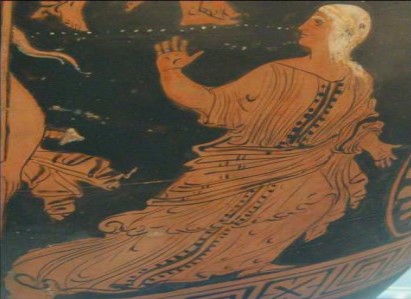Hekabe is the wife of the Trojan king Priam, the mother of Hector, Paris, Cassandra and many other children. When Priam goes to Achilles’ hut to retrieve Hector’s dead body, he introduces the queen as the mother of nineteen children (Il. XXVI, 492 ff.):
Yet how black is my fortune,
I have raised valiant sons
in Troy,
but I don’t have any of them left.
The day he came, the sons of Akha came here
I had sons, I had fifty,
nineteen from one womb
was born,
Others were given to me by courtiers.
Hekabe portrays the fertile and unfortunate main type in ancient literature. This character, which appears in the Homeric epics, was exaggerated by the tragedies later on, and after Hekabe lost her children one by one and witnessed their terrible destruction and torture, she became the symbol of the motherly being, who was mad and attacked like a dog. In some legends, it is claimed that he could not bear the pain of his child and turned into a howling female dog day and night. When we first appear in the Iliad, Hekabe is shown as a soft-spoken, generous and religious mother (Il. VI, 253 ff.). Returning to the city from the war, he asks Hector to rest a little, drink wine and cool off, but when his son refuses, he grants his wish: He goes to the temple of Athena to offer an offering. Then, throughout the episodes, Hekabe is not mentioned until he comes over the West gates to watch Hector and Achilles battle. Then, he calls out to let his son, who was outside the walls and stood alone against the enemy, inside (Prov. XXII, 83 ff.):
“Hector, my child, show respect
Bring this breast the days when I put it in your mouth
to your mind,
You forgot all your troubles in my bosom
look at being eaten inside our walls
boar,
come in, dear boy, outside
stand in front of you.
If this man kills you, hey solid
hearted,
We will not be able to put your dead on a mattress,
What will I cry in front of you,
What a generous wife who bore you will weep, my eye
his baby,
will eat you nimble dogs, far from us, by your ships”.
When Hector did not listen to his parents’ pleas and died in the war with Achilles, a cry broke out in Troy, the king, queen and all the people began to lament and cry, Priam buried his head in dust as a sign of mourning (Prov. XXII, 406 ff.):
… His mother was also pulling out her hair,
she threw away her shiny headscarf, beating, looking at her son
she was screaming…
Began Hekabah among the women
in a long web:
“Look at your mother, my child, your unfortunate mother,
Let me see your pain, you die
Let me see, how shall I live from now on,
how?
You were the light of my heart day and night
in this city,
The power of women and men of Troy
support,
he saluted like a god, baby
they you, you were their great glory while alive
But baby, your death by fate
you have it now”.
A few thousand years have passed, but Anatolian women lament their dead mother’s lambs with these words.
Hekabe tries to detain King Priam, who tries to go to the enemy and beg, in the name of reason and common sense, and when he fails, he goes to the way of praying to the gods and offering offerings, he endures and waits. When the corpse of his beloved, valiant son Hector is laid before him, he neither shouts nor barks like a dog, but brings him to life with an Anatolian woman’s solemnity and imagination (Il. XXIV, 575 et al.):
Now you, as if you heard my word,
You are sleeping in your house fresh,
you are like Apollo’s sweet, arrow
to the people he hit.
This is how the poet Homer from Izmir portrays Hekabe, and the Athenian tragic writer Euripides made him the protagonist of his tragedies “Women of Troy” and “Hekabe” and elaborated his drama in depth. In these games, we see Hekabe crawling here and there as a slave after Troy was destroyed. The queen maintains her splendor and virtue, but when she sees that her daughter Polyxene is sacrificed to the spirit of Achilles before her eyes, and that her son Polydoros, who was entrusted to the Thracian king Polymestor, is also viciously killed and thrown into the sea, she commits a terrible act of revenge and kills Polymestor. blind and kill their children. However, Euripides also shows Hekabes as a great person who does not leave the way of reason and truth.
In these tragedies, Hekabe is not alone, she is a great presence reflecting resistance in the community of Trojan women, a symbol of natural maternal power. It is not in vain that the Athenian poet calls him “Phrygian” throughout the tragedy, Hekabe carries and expresses all the qualities of the Phrygian Mother Goddess Cybele.





















